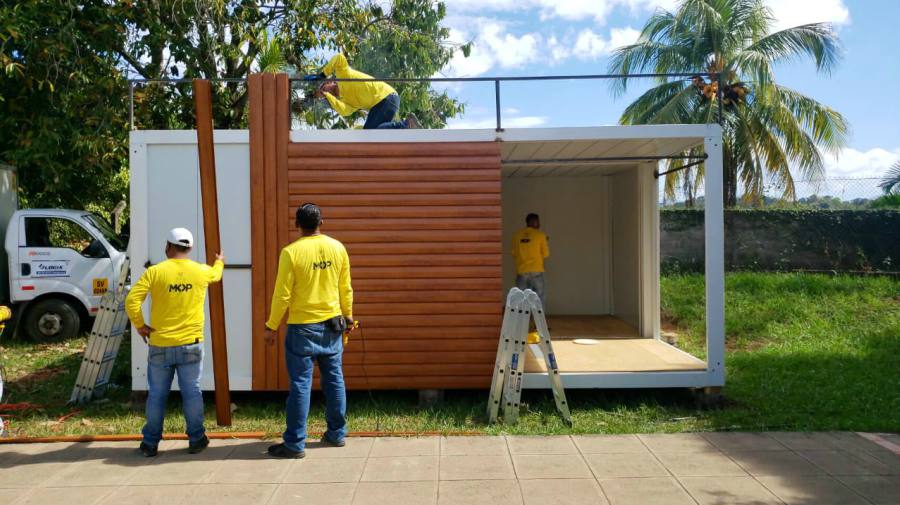
Each cabin costs an average of $ 32,000, according to Alabí. Expenditure on vaccination modules has generated rejection and outrage in the sector of doctors and nurses who describe the action as a waste.
Approximately 156 booths or modules will be built in El Salvador to implement the COVID-19 vaccine. This was announced by the Minister of Health, Francisco Alabí.
The total cost of the cabins will be $ 5 million, as Alabí confirmed during his appearance before the special commission investigating the use of funds to fight the pandemic on Tuesday.
According to the official, each cabin will cost an estimated $ 32,000. El Salvador does not yet have COVID-19 vaccines. Among the first Latin American countries to start vaccinating their populations are Mexico, Costa Rica and Chile.
READ ALSO: The government fails to meet its own phase 3 deadline at Cifco Hospital

Photo / Kindness / @ObrasPublicasSV.
“We continue to work on the installation of 156 vaccination modules, we have 2,000 community health teams, which will provide care to the population in each of these modules,” the Ministry of Health detailed on its official Twitter account.
Alabí also said that El Salvador has “a strong vaccination plan and plan”. He also justified the new investment by saying that “El Salvador will not vaccinate a small percentage, not only will 20% of the population have access, but will provide universal access.”
CONTINUE READING: Minister Alabí disagrees on underreporting COVID-19 cases
The new health strategy generated various reactions. Social media users have criticized the fact that, for example, first world countries, such as the United States, vaccinate on already established fields, stadiums and other infrastructure.
In the sector of doctors and nurses, the cost of the modules has generated rejection and outrage because it qualifies the action as a waste, as the country’s public health system has 700 health facilities with adequate infrastructure, with a cold chain, to keep the AstraZeneca vaccine refrigerated to the required temperature.

One of the modules to be installed. Photo / Kindness / @ObrasPublicasSV
“The medical units are equipped with the necessary infrastructure to maintain the cold chain, which is to keep the vaccine in the refrigerator until the exact moment it is applied. In addition, people who go to communities or who travel on itinerant routes and who cannot go to units wear a thermos that is regulated and standardized with the requirements of the World Health Organization. And that in this case they can work. They do not need additional infrastructure, it is not necessary, it is a waste of resources “, said the former Deputy Minister of Health, Eduardo Espinoza.
According to Espinoza, health had to be strengthened and spent on health facilities, where vaccination sites already exist.
“In my opinion, that (construction) is a matter of propaganda for electoral purposes, but it does not meet the need, the pandemic vaccine simply (construction) should have been added to the effort already in the vaccination program, in which the country has already a great experience “, he argued.
Eduardo Espinoza added that there are 570 community family health teams, which are located nationwide and that their work is itinerant, which are trained for home vaccination. The former official stressed that these health teams have in the past allowed the El Salvador administration to position itself with high vaccination rates, surpassing Costa Rica in immunization rates.
YOU MAY BE INTERESTED: Parking lots, outdoor venues and event centers are COVID-19 vaccination venues in other countries
Without giving further details about when the COVID-19 vaccine will arrive in El Salvador, Francisco Alabí mentioned that the vaccine that will be applied is that of AstraZeneca. This is in contrast to the Pfizer and BioNTech vaccines that are administered in the United States, the European Union, Mexico, Chile and Costa Rica, which require refrigerated storage at ultra-cold temperatures of -70 ° Celsius.
While the AstraZeneca vaccine that will be applied in the country is easier to store because it requires the normal temperature of a refrigerator.